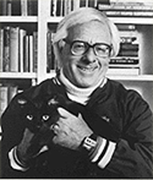 Mike Masnick at Techdirt has more details and commentary on why Ray Bradbury’s novels are are becoming available as e-books. Bradbury is noted for his dislike of new technologies, such as video games and the Internet, and indeed has said that Fahrenheit 451 is not actually about censorship but about new technologies such as television that distract people from reading books.
Mike Masnick at Techdirt has more details and commentary on why Ray Bradbury’s novels are are becoming available as e-books. Bradbury is noted for his dislike of new technologies, such as video games and the Internet, and indeed has said that Fahrenheit 451 is not actually about censorship but about new technologies such as television that distract people from reading books.
But at this point, Bradbury didn’t have much choice—his contracts were coming due, and with e-books at 20% of the market and growing, publishers now require e-book rights as part of new contracts. In other words, if he didn’t allow e-books, Bradbury could have ended up without a publisher willing to take him on. So Bradbury’s agents explained the situation to him, and he gave his approval.
Though, as Masnick points out, the price of the new electronic versions leaves something to be desired.
Of course, if Bradbury is worried that people are going to leave behind his precious paper […], perhaps his publishers are saving him… by pricing the ebook at a ridiculous $9.99. This is for a book that you can buy in a paper copy used for a penny and new for $2.84. And the publisher thinks $9.99 for a version that doesn’t require materials, packaging or shipping should be many times the cost?
I wonder if any other e-book holdout authors will soon discover they don’t have any choice in the matter either?

































*shaking his head in disbelief*
This is silly. So silly. And sad.
Yet again we have the “I can get this free if it falls off the back of a truck therefore the market price should be zero dollars” argument.
And your argument, Duck, appears to be that format is somehow much more important than content in determining price.
When the vast majority of consumers buy a book, they are purchasing the right to “consume” that intellectual property. If I can legally purchase the right to read the book for a penny, at what may be the single largest market on earth (Amazon), hasn’t the market set that as the content’s current value? The market price, for at least this particular book’s content, is demonstrably zero (well, at 0.01, as near as) at this point.
If I am the rare bird who places value upon having a pristine new copy or a first edition, then certainly I can pay more for the privilege (and I have), but if I simply want to consume the content and read it…why does it make sense that I should allow someone to dictate a different price based on format?
For the record, I have a copy of Fahrenheit 451 on my shelf, that I bought new. If I decide to scan it so I can put it on my e-reader, I will. Or if I take it into my head to download an electronic copy from the darknet, I’ll do that. I’ll have a clear conscience in either case, because I paid for the right to read that book, and how I do it is my bloody business. I’m not going to do either, because I didn’t think the book was all that, and because I find Bradbury’s position on advancing technology to be intellectually grating enough that I’m no longer interested in anything else he has to say.
“..Bradbury could have ended up without a publisher willing to take him on”
Please tell me I’m missing something ……
@Howard: Not sure what you might be seeing or missing, but the quandary facing Bradbury is a conjunction of three factors;
1- His books are classified as Science Fiction. Of the various fiction Genres, that one is somewhere in the top three when it comes to the shift to ebooks as the *primary* consumer format.
2- His books are full back list, most being decades old. As the market is moving, backlist is going to end up primarily in ebook format because, as pointed out above, there is no shortage of *used* Bradbury books out there. (Hence the prices.) And he’s far from alone there.
3- With the ongoing battles over ebook rights for “legacy” (pre-ebook era) books, the publishers have adopted a policy of bundled e- and p- rights. No exceptions just because the author is a luddite. (After all, his *estate* might have different ideas, if and when.) Of course, having paid for the rights…
In other words, once the corporate bean counters got done crunching numbers they probably figured (correctly) that, moving forward, the bulk of the profits from the Bradbury catalog would come from ebooks. Especially when priced at the $10 price point. And that without those rights, they might just be better off walking away.
After all, the corporate bean counters aren’t all that fond of the *print* backlist to start with. When it come to investing dead tree pulp, they’d rather bet it on one new title than a hundred slow-moving backlist titles.
Think of it as yet another sign of the impending industry tipping point.
Felix – I apologise. I would have thought my point was obvious.
Why on earth would “Ray Bradbury” NEED a publisher and another contract ?? For what reason ? For what purpose ? Am I the only one missing something ?
@Howard, to keep his books in print so he can continue to earn royalties. His old contracts were expiring which would mean no more new, royalty earning, copies of his books would be put out.
Brian – why does he need to keep his books in print ? Have you heard of eBooks ? of self publishing ? of Amazon ? of Smashwords ?
Bradbury has absolutely no need of publicity. He has made a fortune already. he would get 70% royalties on Amazon and elsewhere and he would also take 100% on his own site which would also need minimal promotion.
His inane choice to suck up to the publishers probably reflects more on his own personal sillyness and small mindedness.
@Howard: You did see the part about how Bradbury is an avowed neo-luddite, right? 😉
At his age (91) the take from the new contract isn’t likely to impact his lifestyle so the money he’s giving to the publishers is probably headed to his descendants. Or a foundation somewhere.
There are some that think you’re not really an author without a publishing contract from one of the Price Fix Six and he might be one of those. Some people really need the stamp of approval of one of the BPHs to feel validated.
Or maybe he just prefers to deal with the devil he knows.
To me the news isn’t so much that he caved in but rather that, even for household name writers, the publishers wouldn’t sign a deal without the e-book rights.
Mr. Bradbury is 91 years old. I can understand that he just wants to extend his existing contracts and keep his current income, instead of completely changing the way his books are published. Let his estate worry about that in the future.
Felix – I did say “His inane choice to suck up to the publishers probably reflects more on his own personal sillyness and small mindedness.” So I believe that answers your first question 😉
Yours and Geertm’s point about his being 91 etc etc … is perfectly valid. I agree.
But it doesn’t make his decision the best decision and that is all I was pointing out. Choosing to go with self publishing via, say, Amazon, would not have been any more complex or troubled. But clearly the point about what he considers to be a ‘real’ writer is probably right on the money. Quite sad really.
No, it probably wasn’t the best decision for his heirs, judging by what the estates of other prominent authors have done with their legacy. But people do have a right to their opinions and to stay in their comfort zones.
And we don’t know what people have been whispering in his ear.
Wasn’t it just a couple weeks ago we saw that innuendo-filled article on how Amazon could theoreticaly, possibly, rip-off authors by mis-reporting sales and they allegedly wouldn’t even know it?
I strongly disagree with the luddites myself, and I’ve heard some hair-raising assertions about the evils of modern civilization, but I can still see where they’re coming from. In the end, everybody responds to the outside world according to their own biases and experiences.
Not everybody feels comfortable living in internet time.
(Or even the Pan-Am jet-age. 🙂 )
Felix – I agree fully, especially with your point about what people may be telling him.
We have seen over the last couple of years how publishers have poisoned many writers minds on the subjects of publishing, piracy and self publishing. From reading the blogs and comments of many authors over that period, and still today to some degree, it is quite transparent that they have been deeply prejudiced by the nonsense propaganda spread by theirs and their colleagues publishers.
I hope that times are changing now. The facts appear to have overtaken the propaganda because there is no hiding place on the web and informed authors have spoken out loudly.
We don’t know the terms of Mr Bradbury’s contract. But we do know that 6 publishing companies were interested. His agent assuredly chose the one with the most favorable terms. To have 6 chase after you is incredible. If his contract is similar to others in his position, he is probably receiving 50% royalties.
So … 20% less than Amazon then.
“And your argument, Duck, appears to be that format is somehow much more important than content in determining price.”
Ebooks do not magically coalesce from the Dirac sea of potentiality. They require work to transcribe, format, and publish, as well as work to track sales and calculate royalties and other payments. And the market has determined that all of this, plus a bit of profit, typically costs the consumer $9.99.
Incidentally it’s pretty funny that you’re proudly declaring that you’ll steal a copy in an attempt to rebut my joke about how thievery is not part of legitimate price discovery.